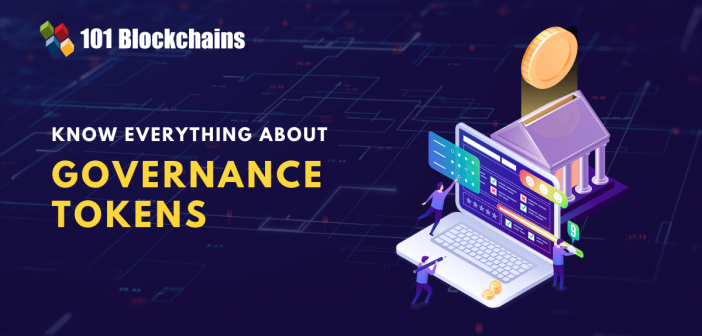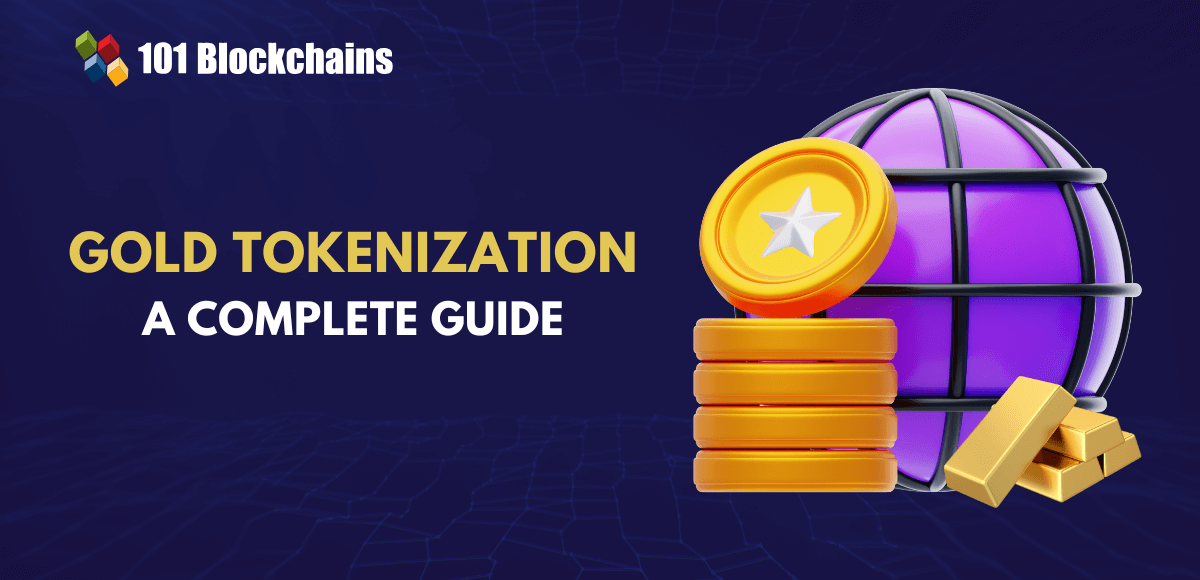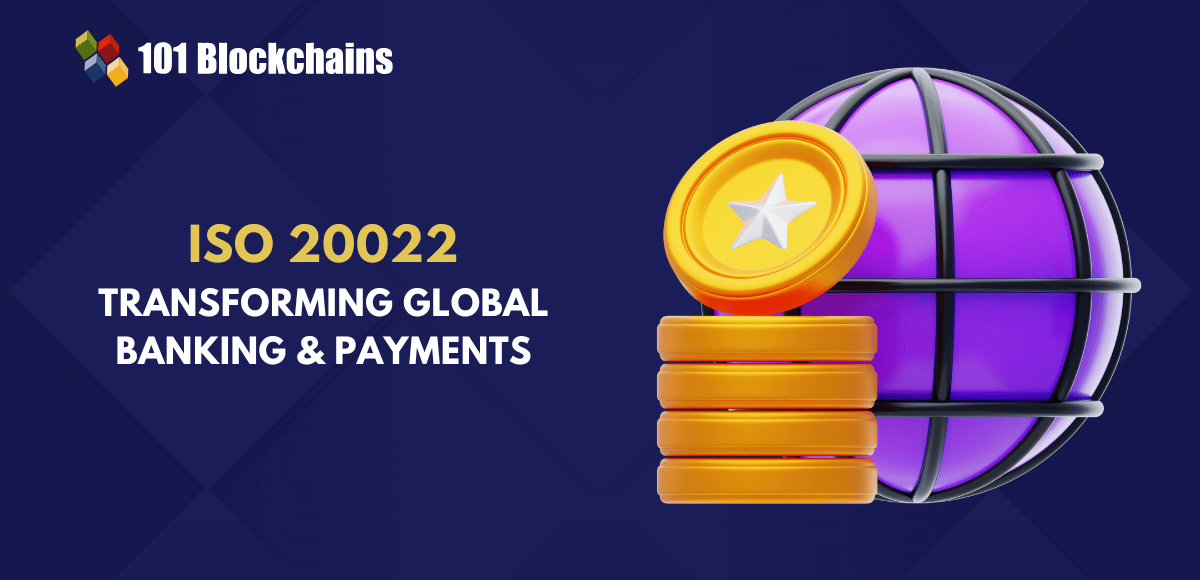Learn how blockchain truly works, master key definitions, and uncover what makes smart contracts so "smart." Dive into the fundamentals, gain valuable insights, and start your blockchain journey today!

- Guides
James Howell
- on May 19, 2022
What are Governance Tokens and why does they matter?
Tokens are one of the integral highlights in the crypto and web3 landscape. As of now, a major share of the discussions around tokens reflects on the classifications of fungible and non-fungible tokens. In addition, you can explore many other types of tokens, such as utility, platform, and security tokens.
Most important of all, governance tokens have become one of the integral highlights of the evolving web3 industry. They have an important function in terms of decentralization of the web, which is one of the basic tenets of web3. The following discussion helps you learn more about governance tokens and their significance, along with some practical examples.
Build your identity as a certified web3 & blockchain expert with 101 Blockchains’ Web3 & Blockchain Certifications designed to provide enhanced career prospects.
Definition of Governance Tokens
The first thing you need is an account of governance tokens explained clearly in their definition. The term governance token gives away a lot about its definition. Basically, it is a token that offers governance rights within a particular dApp, protocol, DeFi solution, or game. On the other hand, it is important to find how governance tokens and crypto meld together and the positive implications. The centralized structure in traditional companies relied on a board of executives or a single leader to decide the company’s future. Decentralization flipped the narrative of centralized governance in traditional organizations with smart contracts and tokens.
Now, tokens and smart contracts in various governance tokens examples would show you how they enable the distribution of power among token owners. Therefore, any individual with a governance token can have the privilege of introducing new proposals for protocol improvements and participating in decision-making processes.
You must also notice the different possible ways of distributing power among token holders. New approaches for determining voting power have been challenging the conventional precedents for allocating one vote to one token. Now, the duration for which token holders hold a token plays a vital role in determining their voting power.
Want to learn and understand the scope and purpose of DeFi? Enroll Now in Decentralized Finance Course!
Applications of Governance Tokens
The next important doubt on your minds right now must revolve around the significance of a governance token. Many people ask, “why are governance tokens valuable” from a monetary perspective. However, it is important to look at the possible reasons for which governance tokens would define the future of web3 and crypto.
First of all, you need to take a look at decentralized finance (DeFi) and how it changed conventional precedents. How can you achieve complete decentralization? The answer lies in exclusive dependence on smart contracts alongside a delegation of voting powers to the community.
At the same time, it is also important to note how governance models have been there before DeFi solutions. As a matter of fact, the origins of a governance model go back to the year 2016, when a DAO successfully conducted an ICO and gathered almost $120 million. What exactly drove people to invest such a massive amount in governance tokens? In simple words, a governance token is a cryptocurrency or token which allocates voting power to token holders on a specific blockchain-based project.
The in-depth overview of governance tokens explained clearly shows their role as the utility token for the popular DeFi landscape. Governance tokens can serve as a promising tool for distributing voting powers and exclusive rights to users through tokens. Governance token holders can introduce new governance proposals or vote on proposals introduced by other community members. Community members can leverage the tokens to impose a direct influence on the future direction and traits of the blockchain-based project. Some of the notable applications of governance tokens in defining the future of a blockchain-based project include the following.
- Votes on different fees associated with various network transactions.
- Ensure best practices for the implementation of UI modifications.
- Modifications in reward distribution from the transaction fees.
- Revisions in developer funds.
Furthermore, the applications of governance tokens in crypto are not limited only to voting privileges within the protocol. As a matter of fact, you can employ governance tokens for staking and taking out loans or obtain some passive income through yield farming.
Want to become a Cryptocurrency expert? Enroll Now in Cryptocurrency Fundamentals
Significance of Governance Tokens
The importance of a governance token becomes clearly evident in the fact that it supports effective power distribution. However, the answer to “why are governance tokens valuable” draws references to deeper significance of a governance token. The first highlight of a governance token refers to the fact that they lend a voice to every participant in decentralized ecosystems.
Governance tokens can help developers with freedom from making hard choices regarding the project. On the contrary, developers can interact and obtain feedback from the community to identify any discrepancies in the project. As a result, it becomes easier for developers to understand the reasons for introducing certain changes or the rationale for specific project initiatives such as fund management and partnerships.
The value of governance tokens also depends on the fact that they are an integral part of the decentralized web. You would not find any pre-mined governance token repository. In addition, the decision-making process with governance tokens is accessible only to people invested in a specific platform. You can think of the tokens as shares in a company, which can help you reap the benefits of an organization’s success.
Start learning Blockchain with World’s first Blockchain Career Paths with quality resources tailored by industry experts Now!
Benefits and Challenges of Governance Tokens
The detailed overview of governance tokens explained in detail shows how they are one of the crucial tools for decentralization. Here is an outline of the advantages and setbacks with governance tokens you should keep an eye out for.
Benefits
- The foremost advantage of a governance token is evident in the facility of decentralization. Developers can introduce decentralization in web3 projects, primarily due to governance token integration. Without a specific governance token, you are more likely to find DeFi solutions as a bunch of smart contracts stuffed into one platform. In other words, the advantage of governance tokens in crypto focuses on the way they show tangible proof of true decentralization.
- With the advantage of voting with the governance token, you can figure out how they can open up collaboration opportunities. Voting allows an open stage for discussions, subsequently leading to productive collaborations. Governance token holders can express their vote on issues for the network while receiving incentives for collaborations with other community members.
- The next promising benefit of entries in a governance tokens list would obviously point to efficiency. Collaboration among community members through a governance token creates a sense of involvement among community members. Active collaborations among community members in the decision-making process and determining new definitions of governance models help in improving efficiency.
Learn the fundamentals of Decentralized Finance (DeFi) with DeFi flashcards!
Challenges
- The first challenge with governance tokens refers to the existence of selfish and malicious actors. Such agents in a project would always vote for self-interest rather than on decisions that can benefit the overall community.
- The biggest loophole in the descriptions of governance tokens explained in detail refers to the limited overview of accountability. What could you do when the project fails? Who will bear the responsibility for the project’s failure? No one would openly claim that they voted on a proposal that spelled doom for the project.
- Whales are also one of the formidable challenges for governance protocols, as they can take over a majority of tokens. Subsequently, the whales can impose their will on the project’s future, thereby resulting in an inevitable nightmare for decentralization.
Important Examples of Governance Tokens
The final highlight in any discussion on governance tokens would call for governance tokens examples in different sectors. Here are some of the most notable entries among the latest crypto and web3 projects using a governance token.
-
$YFI

YFI token is the native token of Yearn. Finance project with the advantage of complete decentralization. The primary objective of the developers behind the YFI governance token focused on allocating control to the community. In addition, the governance token also implied a clear emphasis on possibilities for creating a self-sufficient DAO.
-
Ethereum Name Service

Ethereum Name Service or ENS is another top example in a governance tokens list showcasing the allocation of promising rewards to early adopters. The project airdropped tokens in the later half of 2020, causing a massive stir in the crypto and web3 space. As of now, the price of the native governance token ENS jumped up, and early adopters received exceptional rewards for showcasing their support. The ENS token created a lot of hype in the DeFi space and emphasized a lot on active participation.
-
MKR

Another top addition among examples of governance tokens would refer to MKR, the native governance token of MakerDAO. Anyone familiar with examples of popular web3 platforms must have a clear idea of how MakerDAO is one of the top web3 lending platforms. MKR token holders can express their votes on proposals for changing economic rules in MakerDAO governance.
-
UNI

The final entry among popular governance tokens examples would refer to the UNI token of Uniswap protocol. Interestingly, the UNI governance token on Uniswap serves the usual functionalities of a governance token. UNI token holders can vote on proposals and decision-making for the future of Uniswap. On the other hand, developers have tight control over future direction of the project, thereby introducing more centralization in comparison to other protocols.
Excited to learn the basic and advanced concepts of ethereum technology? Enroll Now in The Complete Ethereum Technology Course
Final Words
The final impression regarding governance tokens shows that they are trusted tools for changing the future of the web3 landscape. With the primary objective of introducing true decentralization by directing power towards the community, governance token applications introduce immense value. Governance token holders can create new proposals for improving different aspects of a blockchain-based project.
In addition, they can also vote on proposals by other community members while engaging in active collaboration during the decision-making process. On top of it, the popular entries in the governance tokens list showcase the potential for governance token applications to evolve into something better. Learn more about the value of a governance token and the best practices for using one.
*Disclaimer: The article should not be taken as, and is not intended to provide any investment advice. Claims made in this article do not constitute investment advice and should not be taken as such. 101 Blockchains shall not be responsible for any loss sustained by any person who relies on this article. Do your own research!





